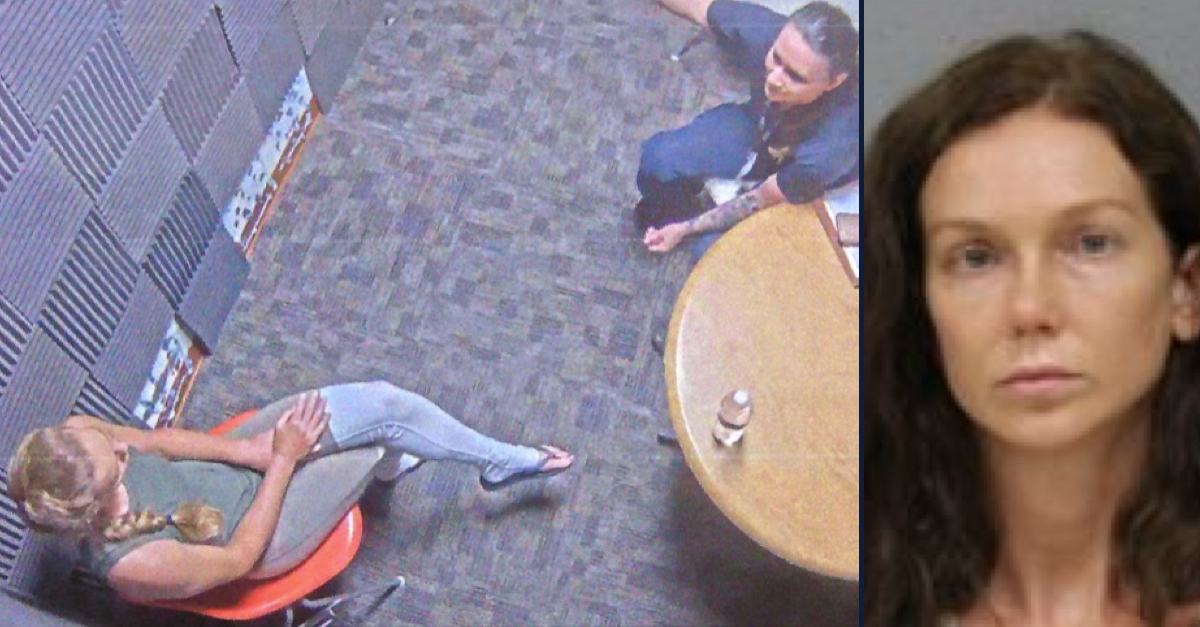
Left: Kaitlin Marie Armstrong is interviewed by police (via court filing). Right: Armstrong’s booking photo after her arrest in Costa Rica (via Austin Police Department).
The Texas woman accused of gunning down a perceived romantic rival will not be allowed to exclude evidence of her initial interview with police.
Judge Brenda Kelly on Wednesday found that there was nothing unconstitutional about the Austin Police Department’s initial interview of murder suspect Kaitlin Armstrong in the days following the shooting death of Moriah “Mo” Wilson.
Wilson, 25, a professional cyclist who was visiting Texas for an upcoming race, was found shot to death on May 11 in her friend’s Austin home, where she had been staying. She and Armstrong’s boyfriend, Colin Strickland, had apparently spent the day together, although Strickland had hidden that fact from Armstrong, according to the police.
Strickland and Wilson had previously had a romantic relationship at the same time as he was dating Armstrong, although it is not believed that they were involved at the time of Wilson’s death.
Now Armstrong, 34, is facing murder charges. In the days following Wilson’s death, Armstrong was arrested and brought into police custody on a 2018 warrant for theft of services; she’s accused of leaving a medical spa without paying more than $650 she allegedly owed for Botox services.
Austin police interviewed Armstrong about Wilson’s death at that time, but ultimately released her, believing the 2018 warrant contained an error. She fled the country days later, and was eventually apprehended weeks later in Costa Rica.
According to local NBC affiliate KXAN, there was actually no error on the warrant.
Armstrong’s lawyer Rick Cofer filed a motion to suppress in August, describing the case against his client as a “misogynistic and fictitious story.”
In the motion, Cofer said that police wrongly used information from Armstrong’s initial interview in an affidavit in support of Armstrong’s arrest.
At the October hearing on that motion, Cofer had argued that Detective Richard Spitler, the lead homicide detective on the case, had reckless disregard for the truth when filing the arrest warrant, and that he intentionally left out crucial information.
Cofer also argued that another detective, Katy Conner, had wrongfully detained Armstrong after being informed that the theft of services warrant had an error.
On Wednesday, Kennedy announced her ruling on the issue, reportedly saying that she didn’t agree withe the defense attorney’s take and denying the request to suppress evidence of Armstrong’s interview.
“[T]here was no evidence of any intentional disregard for the truth,” Kennedy said of the detectives’ interactions with Armstrong, according to KXAN.
Kennedy also said that although the police had fallible material, there was still probable cause to arrest Armstrong when they did.
Armstrong’s defense team had also argued Conner hadn’t complied with Armstrong’s request for an attorney during the initial interview. A defense expert, retired Texas police lieutenant Douglas Deaton, had testified that the interview was “unconstitutional” in the way it was conducted and “not within best practices.”
Kennedy disagreed, saying that it is, in fact, in the best interests of a detective to persuade a suspect to talk.
“Mrs. Armstrong [sic] was reminded on several occasions that she was free to leave,” Kennedy said, according to KXAN. “(Armstrong) was clearly not in custody.”
Kennedy, who term ends at the end of this year, set Armstrong’s trial for June 2023.
[Images via court filing, Austin Police Department.]